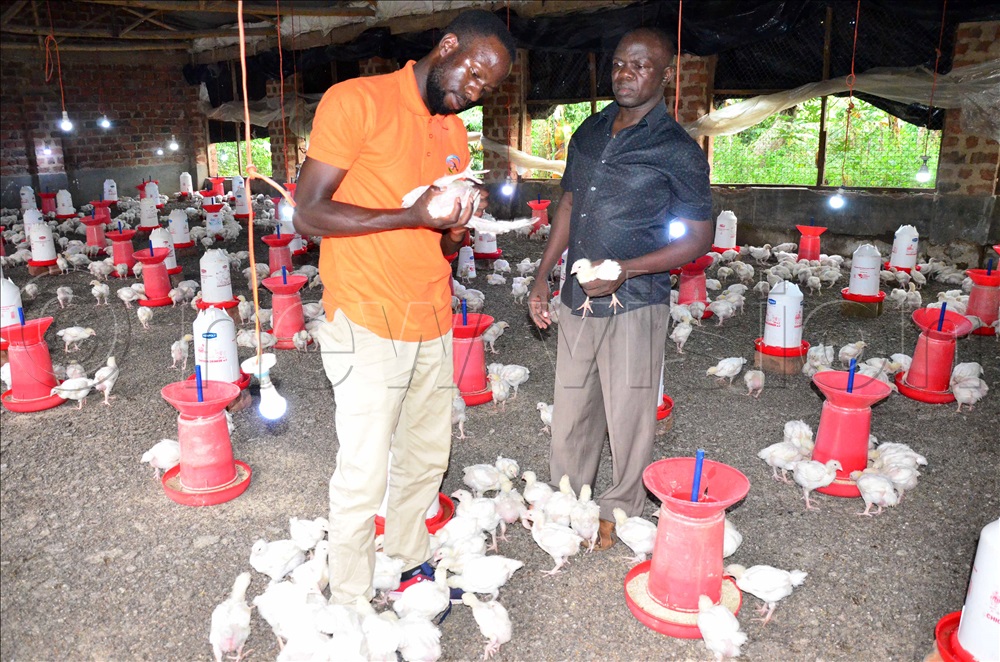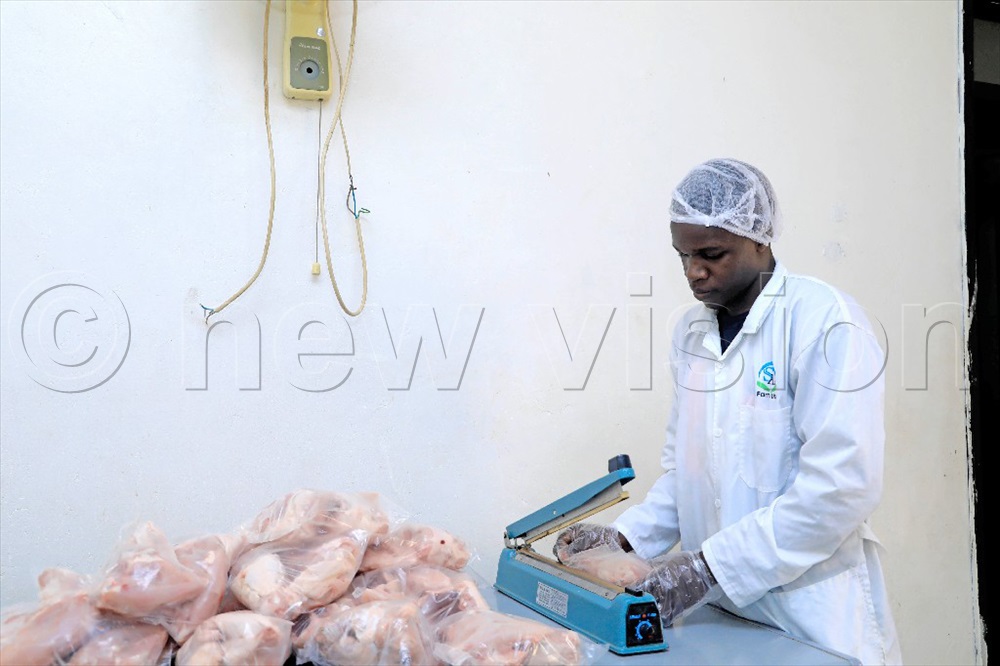By Herbert Musoke
For the ninth year running, Vision Group, together with the Embassy of the Netherlands, KLM Airlines, dfcu Bank and Koudijs Nutrition BV, is running the Best Farmers Competition.
The 2024 competition runs from April to November, with the awards in December. Every week, VisionGroup platforms will publish profiles of the farmers. Winners will walk away with sh150m and a fully paid-for trip to the Netherlands.
Turning a challenge into an opportunity is one of the ways to establish farm businesses that will last the test of time. Abbas Ssekajja has for a long time been in the business of processing, especially of rice and maize into flour.
The business, however, suffered the challenge of disposing of bran, which he would have in tonnes. He either had to burn it or allow it to rot, but this would make his premises stink.
Ssekajja Agro Farms Limited located at Buyukivillage, in Nama sub-county, Mukono district, started in 2016 as a sole proprietorship trading in maize flour in Kitetika, on Gayaza Road in Wakiso district.

Today, he has diversified and does not only rear chicken, but also slaughters and distributes the meat in various outlets. He is a retired soldier, with a diploma in civil engineering from the Uganda Military Engineering College and a degree in statistics from Makerere University.
“I had a friend who had a school in Mukono and wanted flour to feed his students. I acquired a salary loan of sh6m. I used this money to buy maize grain at sh300 per kilogramme and kept it for three months in a store I hired at sh70,000 per month. Then I sold it at sh1,000 per kilogramme in 2011,” Ssekajja says.
He says he made profits that changed his life as he then acquired a mill and started processing maize flour.
Born out of challenges
While consulting on how to manage the bran, Ssekajja realised that poultry would be an alternative venture to ensure the bran was put to use.
Ssekajja adds that because of his passion for farming coupled with a market survey about poultry, he found it advantageous to venture into rearing broilers on a large scale, managing the value chain from parent stock of day-old chicks, rearing to selling dressed chicken.

“Since I had maize bran in plenty which makes it cheap to manufacture feeds, it was easy for me to venture into poultry farming. To ensure expansion and sustainable production, I created a committed network of outgrowers who supply us with birds for slaughter daily,” he says.
All the farm’s products are organic.
“The chicken grows organically without the use of antibiotics or any form of artificial boost to their growth,” John Otupo, the vet manager of the farm, says.
To minimise the use of antibiotics, Otupo says, they manufacture well-balanced feed with all the required nutrients to boost the immunity of the birds, therefore, reducing the occurrence of diseases.
He says the farm which was incorporated in 2020, has a site that houses parent stock, that provides eggs that are taken to the hatchery.
The day-old chicks are then distributed from the hatchery to the main farm and the growing chain of outgrowers. The business has three main departments, that is, feed mill, commercial broiler farming and abattoir supported by five major operations.
“The commercial farm starts from our breeders in Kayunga where over 10,000 broiler parent breeders are kept. Because this is the foundation of quality, the stock is sourced from the Netherlands and France. It’s from these chickens that eggs are collected and hatched to get day-old chicks which are stocked for commercial rearing and also distributed to outgrowers,” he says.
Expansion and growth
With the increased demand for Ssekajja’s dressed chicken, the farm has continuously been increasing the number of outgrowers and now works with over 1,000 spread across Kampala, Wakiso, Kampala, Mukono and Luwero districts rearing 3,000-10,000 chicken each cycle of six weeks.
The increasing number of outgrowers called for an expansion in structures, machinery and personnel which all required funds.
“We credit the recent growth and expansion of the company to the intervention of USAID Strategic Investments Activity through Goldstone Enterprise Consulting & Training (Goldstone Enterprise),” Ssekajja adds.
Fahad Kasule, the chief finance officer of the farm and a seasoned financial management consultant, says in 2022, the company faced a major financial crisis.
They had made significant infrastructural investments and were struggling with working capital to enhance production.
The farm administration approached USAID Strategic Investments Activity, which facilitated the acquisition of loan financing for Ssekajja Agro Farms with sh2.1b (sh2b from one bank and sh100m from another).
This timely effort enabled the business to get the required working capital to construct a breeder farm, acquire chicken feed raw materials and operationalise the new machinery they had acquired.
This also enabled the business to fully move their operations from a rented premise in Kitetika, Gayaza in Wakiso district to their own home at Buyuki village, in Nama sub-county, Mukono district.
“The funds were used to purchase land, onboard contractors and construct a breeder farm in Kayunga to boost the business by providing the day-old chicks regularly,” he says.
Before that intervention, the company had acquired capital that enabled it to set up carpets and farmhouses, purchase equipment for the abattoir and feed mills and improve staffing.
In addition, the board members have undergone training to provide effective and efficient strategic oversight for the business which greatly improved the company’s corporate governance.
It has also led to the recruitment of a strong financial management team, set up a fully-fledged finance department and trained staff to ensure efficient financial operations.
Workforce
The farm employs 167 staff, with 46 permanent and the rest casual workers, most of whom are women paid between sh300,000 and sh3m per month in addition to medical care and providing lunch.
The chicken business earns profits ranging between sh2,000 to sh3,000 for a live chicken and sh5,000 and above per kilogramme of dressed chicken.
Ssekajja says this income has improved the livelihoods of smallholder farmers working with Sekajja Agro Farm.
Women around Goma town council have also benefited greatly from the business, establishing a robust network of roadside chicken ventures that cater to both the local population and businesses within the district.
The maize business
Ssekajja says the maize business is still running with the factory processing 300 tonnes of maize flour per month.
The flour is sold under the brand name of Sesera Millers and delivered door-to-door in the areas of the north, west, especially Mbarara and central.
“We also have an outgrower scheme in the maize business working with over 2,000 farmers in Kayunga, Mukono and Luwero districts. We supply these farmers with inputs like quality seeds, fertilisers and pesticides among others and buy from them at a competitive market price,” he says.
Achievements
Ssekajja says the greatest achievement has been breaking through the chicken market which has been long taken by foreigners.
“On the other hand, through the proceeds we managed to expand and open up other branches in Luwero. Also, setting up the outgrower project which has boosted our returns,” he says.
Poultry slaughterhouse
Ssekajja says the company has a slaughterhouse where 3,000 birds are slaughtered everyday totaling 21,000 birds per week.
The chicken is marketed at the company outlets located in different towns in Kampala, Wakiso, Mukono, Jinja, and Hoima. A kilogramme goes for sh11,500 wholesale and sh14,000 at the outlets.
Apart from individual buyersthe company has hotels, supermarkets and restaurants they supply daily.
He adds that at the slaughterhouse, they have a cold room to store the dressed chicken and at the outlets they have deep freezers to keep the chicken fresh.





